Follow Your Different
295 How To Have A Legendary Career In Tech, Designing The A.I. Category, & IPOing with Bruce Cleveland, Bestselling Author of Traversing the Traction Gap
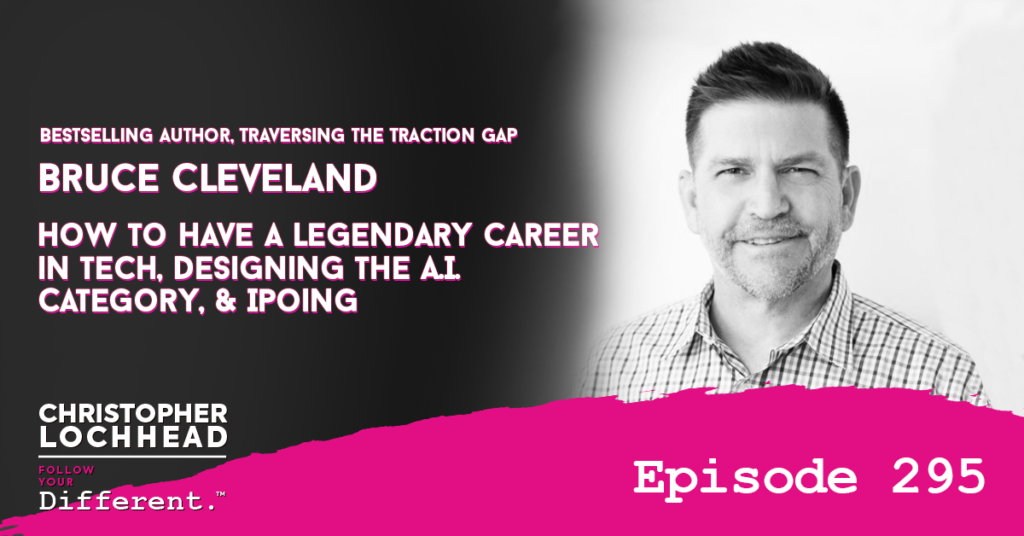
Podcast: Play in new window | Download (Duration: 1:16:17 — 52.4MB) | Embed
Subscribe: Apple Podcasts | Spotify | Pandora | RSS | More
On this episode of Christopher Lochhead: Follow Your Different, we go deep with one of my favorite people in Silicon Valley, Bruce Cleveland.
Bruce Cleveland has had a career in Silicon Valley for over 40 years. And he’s pretty much done it with building companies, technologies, categories, and brands, as well as working on and with some of Silicon Valley’s best executive teams and entrepreneurs. He’s been a successful investor.
He’s also a bestselling author. In fact, one of my favorite books is Traversing the Traction Gap, which he wrote. And I recommend it to all entrepreneurs.
By the end of this dialogue, we hope you’ll have gained radical new insights into how you can do legendary things in your life and career.
Traversing the Traction Gap
The conversation begins with a discussion of Bruce Cleveland’s book, Traversing the Traction Gap. His best-selling book was praised by Silicon Valley insiders and many entrepreneurs for the information and insights it provided.
Bruce shares that his reason for writing the books stems from people trying to make VC seem like a mystical thing, rather than explaining things in a clear way.
“The reason I wrote it was because I began to grow pretty weary of really, really smart people not making it. Their companies not surviving for a variety of reasons. And they all tended to be pattern-matched against those reasons. I was also not happy with the venture community in its entirety, because I don’t think it was honest with a lot of these entrepreneurs as to why they weren’t getting investments, etc. And I kind of wanted to demystify those issues.”
– Bruce Cleveland
Bruce Cleveland on helping out entrepreneurs
Another reason Bruce gives for writing out the book is that he wanted to help out fellow entrepreneurs who may be feeling lost, or guide those who are doing well into things that could make their ventures better.
“The purpose and objective of this book was to share with entrepreneurs that, “hey, here’s some things you could possibly do to significantly enhance the probability of success.”
You know, we only get one shot at this life, I felt like I owed it back to the entrepreneurs of the world who take all the risk as to what I saw, from my vantage point, both as an operating exec and as an investor, to why I thought things weren’t working for the vast majority of startups.”
– Bruce Cleveland
C3.ai and Enterprise AI
The conversation then goes to Bruce’s latest ventures into category creation. Together with Tom Siebel, they founded C3.ai, which delves into enterprise AI.
Bruce then talks about how it came to be, and how working on C3.ai has been so far.
“I think this is one of the benefits of having a CEO who understands and believes in category creation, is that it as your job as CMO becomes much easier to do.”
– Bruce Cleveland
When they started conceptualizing and creating the category of enterprise AI, the term wasn’t even on the radar. While there were companies who were doing something similar to a lesser degree, it wasn’t clearly defined, and no one was pursuing rapid advancement on it.
Now, it’s something that a lot of companies are looking at, and C3.ai is at the forefront of it.
To hear more from Bruce Cleveland and how to have a legendary career in VC and tech, download and listen to this episode.
Bio
Bruce Cleveland’s career in Tech spans more than 40 years as a venture investor and operating executive.
He was a first investor and a board member of Marketo, which held an IPO in 2013 and was acquired in 2018 by Adobe for $4.75B.
He was an early-stage investor in other notable companies such as C3.ai, Doximity, Vlocity, and Workday. Bruce also held senior executive roles in engineering, product management and product marketing at Apple, AT&T, C3.ai, Oracle and Siebel Systems.
His book, Traversing the Traction Gap, is a prescriptive guide for startups and new product initiatives within larger companies helping teams to use ‘market engineering’ techniques to successfully transition from Ideation to Scale.
He attended the US Military Academy, West Point, New York, and received a BS in business administration from CSU, Sacramento. He lives in the San Francisco Bay Area.
Connect with Bruce Cleveland!
Check out his book here: Traversing the Traction Gap
We hope you enjoyed this episode of Follow Your Different™! Christopher loves hearing from his listeners. Feel free to email him, connect on Facebook, Twitter, Instagram and subscribe on iTunes!
Pause for Democracy
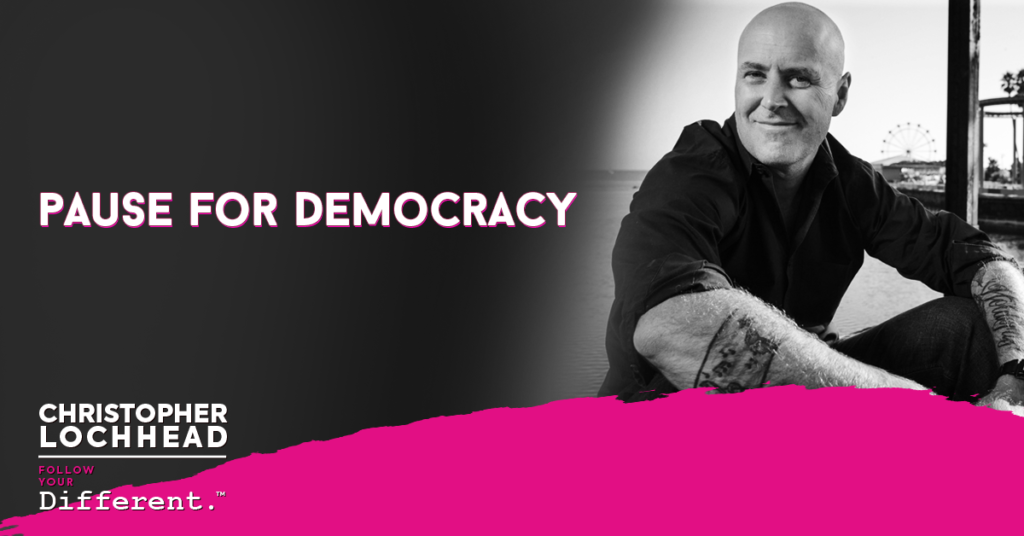
Podcast: Play in new window | Download (Duration: 1:52 — 1.3MB) | Embed
Subscribe: Apple Podcasts | Spotify | Pandora | RSS | More
In observance of the Midterm Elections in the United States, we will not be dropping full normal episodes of Follow Your Different this week. And if you are American, I do hope you get out and vote. It is, in my opinion, one of the most patriotic things you can do.
I also just wanted to read you a little something that I wrote recently on LinkedIn that I think is germane. Because whatever happens in the American midterms, roughly 50% of the country is going to be elated, and 50% of the country is going to be pissed. So let me do a little reading for you here.
“Today, more Americans hate more Americans than ever. And yet, we all know hating someone because they disagree with you might be the biggest stupid of them all. So how did this happen in the oldest surviving democracy in human history?
It’s because politicians, media, and social media, on both sides, create hate. Politicians, media, and social media, on both sides. monetize hate. We took the bait and internalize the hate, but it’s not too late.
We can start really thinking. We can start really dialoguing. We can start really making a difference. American on American hate stops with us. This is something every American can be a leader on, and frankly, everybody in the world can be a leader on. American on American hate stops with us. God bless America and God bless the world.”
294 Quit A Job You Hate For The Work You Love with Pat Hiban, Bestselling Author of The Quitter’s Manifesto
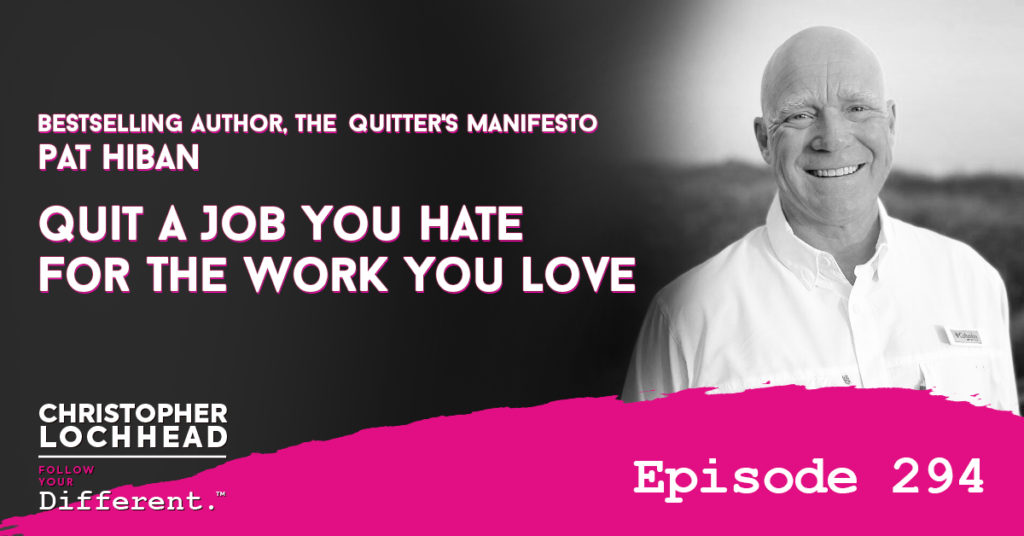
Podcast: Play in new window | Download (Duration: 1:05:01 — 44.6MB) | Embed
Subscribe: Apple Podcasts | Spotify | Pandora | RSS | More
On this episode of Christopher Lochhead: Follow your Different, we discuss the idea of keeping a successful career that you have stopped liking a long time ago versus quitting it to find one that you find more fulfilling. And who better to have this conversation than with our guest, Pat Hiban.
Pat Hiban is the bestselling author of the book, The Quitter’s Manifesto. He is an investor, author, podcaster, and a guy having a very good time living an epic life.
By the end of this dialog, you will gain radical new insights to build your muscles for designing the life of your choosing, and not just do something because of a current trend.
Pat Hiban on The Quitter’s Manifesto
The conversation starts with Pat Hiban’s book, The Quitter’s Manifesto, particularly on the topic of why he wrote it, and his inspiration while doing so.
Pat shares that during the past year or so that we were all locked up, people had time to think a lot about their work conditions, and what they want to do in life.
“It was during COVID. I just heard of a lot of people making decisions to change jobs and the change the location of where they were working from. Also, we had this great resignation going on.
I saw it, and I called Tim and I was like, “Tim, the one thing that I learned from you, you are my mentor in quitting, and I said, we should write a book on quitting.”” – Pat Hiban
So Pat and Tim Road pooled their thoughts together and The Quitter’s Manifesto was born.
Quitting is Scary
Pat’s idea for the book was that it should be a tactical, step-by-step book. So first things first, they have to acknowledge the reality of things: that quitting a stable career is scary.
“The first chapter in the book is called, Acknowledging the Truth. And the truth is, quitting is very, very scary. It’s like going to a cliff and jumping off.” – Pat Hiban
For entrepreneurs, taking the jump is just Tuesday to them. This is because before they jump, they already have a parachute or glider ready even before they take the leap. Normal people do not always have those prepared beforehand, and jump blindly to their doom.
So the aim of The Quitter’s Manifesto is to create rope swings that they can hang on each chapter, and at the end of it all, a net of safety when you finally decide to take the plunge.
The Company Healthcare Trap
The conversation then shifts to the topic of job fluidity being hampered by healthcare being tied to their employment. There are a lot of people who stick it out with big corporations for less pay, because of the healthcare benefits that they could have. So a lot of people end up being stuck or always teetering at the edge of quitting, until they find something with enough income that it overshadows the healthcare benefits they get.
The weird thing about this is that they may already be earning a lot more monthly than that potential “healthcare benefit” might provide, but they still hedge because they don’t want to let go of that supposed “security blanket”.
“I talked to a guy yesterday that had a family health care plan, it was worth $2,000 a month. And he wouldn’t quit his work because of it, even though he was flipping real estate on the side, making 400 grand a year. He wouldn’t go to flipping real estate full time, just because he wanted that healthcare. And then he finally did quit, and he realized how minuscule that the healthcare actually was, it didn’t matter.” – Pat Hiban
To hear more from Pat Hiban and The Quitter’s Manifesto, download and listen to this episode.
Bio
Pat Hiban
As a young child, Pat Hiban was labeled “learning disabled with speech deficiencies” and put into special classes.
Through his teenage years, Pat fell forward through life and tried everything he could to find his purpose, including 2 years as a 4th string player (benchwarmer) on the lacrosse team.
He graduated from college with a degree in sociology and a 2.6 GPA. After being turned down for several corporate sales positions out of college, Pat jumped into real estate and sold 10 homes his first year (6 condos, 1 house, and 3 mobile homes); he earned a total of $13,200.
Through the consistent application of 6 steps, Pat grew his real estate business each and every year.
In 2004, he became the #1 RE/MAX agent in the world.
In 2006, he was honored with the same recognition by Keller Williams Realty. Now, having sold over 4,000 homes and over one-billion dollars in volume, Pat is one of only a handful of residential real estate agents internationally to hold the title of Billion Dollar Agent. Pat is also an avid real estate investor, a venture capitalist, and the founder of Rebus University: an online training platform for real estate agents who want the secrets that most successful agents try to keep to themselves.
On average, Pat takes 153 days off each year to spend with his wife of 18 years and his two daughters.
In his book, he outlines the exact process he follows to earn more working less so you can too. He lives in a suburb of Baltimore, Maryland.
Pat’s book is titled “6 steps to 7 figures” and includes a glowing introduction by Gary Keller, co-founder of Keller Williams Realty and three-time bestselling author.
Connect with Pat Hiban!
Gobundance.com | HibanDigital.com | LinkedIn | Real Estate Rockstars podcast
Check out Pat Hiban’s works here: Amazon Books
We hope you enjoyed this episode of Follow Your Different™! Christopher loves hearing from his listeners. Feel free to email him, connect on Facebook, Twitter, Instagram and subscribe on iTunes!
293 Solar Energy, Opportunities & Myths with Bill Nussey, Author of the no.1 Bestseller “Freeing Energy”
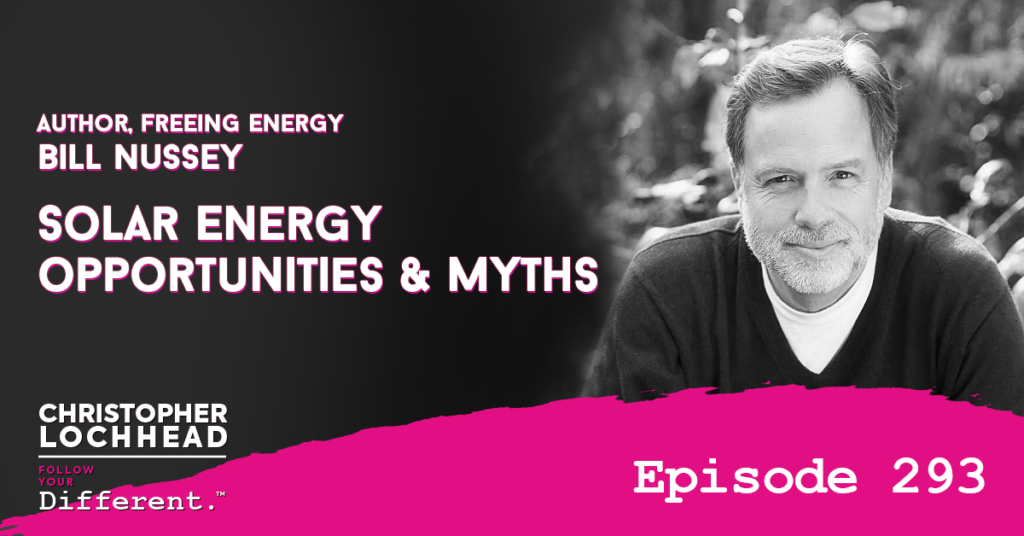
Podcast: Play in new window | Download (Duration: 1:29:44 — 61.6MB) | Embed
Subscribe: Apple Podcasts | Spotify | Pandora | RSS | More
Most of us are interested in what is happening in the electric energy revolution. So it is logical that people want to understand how this different future will impact ourselves, our families, our communities, our work, and our world. On this episode of Christopher Lochhead: Follow your Different, we talk to Bill Nussey to clear the air about renewable energy.
Bill Nussey is a best-selling author, and his book, Freeing Energy is a fact-based, clear-eyed look at how innovators are using what he calls a local approach to solar to develop whole new categories.
What you’re about to discover is how learnings from the information technology and entrepreneurship world are now driving breakthroughs, in energy and in specific solar energy. We go right at some of the myths about solar energy, and the trillions in New Category potential that Bill sees for entrepreneurs and investors in solar energy.
Bill Nussey on Legacy Power Technology
Bill starts of the conversation by describing how outdated the current grid system that we are using to power homes and businesses around the country.
He describes past inventors like Graham Bell and Wright Brothers, and how proud they would be if they were to see how far their inventions have evolved over time. Unfortunately, the same could not be said about the technology running our power grids.
“If I were to go back to Thomas Edison, Nikola Tesla, George Westinghouse, any of the fathers of the original grid 100 years ago and bring them forward. They would look around and say, “WTF, this is the exact same system.”
Every other part of the industry & technology has been completely changed, yet this is the same. – Bill Nussey
Why Nothing has Changed
All of this could be traced back to the business model being outdated, yet no one is taking a huge leap in changing. That’s because they are afraid of losing the monopoly they have over distribution, should their new venture fail. Every one of them is risk averse and more than happy to just keep the status quo.
Though it might look broken at times, it’s not to say that the grid can’t handle the capacity. It’s just that overall consumption is steadily growing, especially during peak hours when everyone is at home, using their devices and charging up their EVs.
That said, this also fuels the rhetoric of how monopolies work, which is “if it is not noticeably broke, then we don’t have to fix it.”
Myths about Renewable Energy
Bill then talks about the general misconceptions and myths surrounding renewable energy, particularly those who insist that it is worse than what we currently have now.
One major misconception that still prevails is that creating the materials to harvest renewable energy is simply too expensive and generates a lot of waste that it supposedly should prevent. The main target of this argument was solar panels, which back then was costly to make, and usually have a long Return of Investment (ROI) for potential adopters.
While it may have been a reasonable argument in the past, nowadays technology and further development has made it so that manufacturing these materials don’t require as much energy and resources as it did before. If you are willing to spend a little extra, you can even have the manufacturer create 0% net carbon panels for you.
New technology will continue to make more efficient, and more affordable things in the future. It’s all a matter of if and when you are willing to adapt to the new circumstances.
To hear more from Bill Nussey and how the Renewable Energy category can thrive in the near future, download and listen to this episode.
Bio
Bill Nussey spent most of his career as a tech CEO.
His first company, which he co-founded in high school, provided graphics software for early, text-based personal computers.
Bill’s second company, Da Vinci Systems, was started out of his college dorm room and grew to serve millions of users across 45 countries. Later, he spent several years as a venture capitalist with Greylock.
In 1998, he left the firm to become CEO of a portfolio company, iXL, which went public and grew to $500 million in revenue.
After iXL, he joined Silverpop as CEO. The company grew to nearly $100 million in recurring revenue and became a global leader in cloud-based marketing. In 2014, IBM acquired the company and made it the foundation of the IBM Marketing Cloud.
Shortly after the acquisition, Bill was promoted to IBM’s VP Corporate Strategy, helping the CEO and SVPs set IBM’s strategic roadmap. Bill’s companies have created thousands of jobs and billions of dollars in value.
Bill’s journey into clean energy began with a TED Talk, which grew into 100+ articles and, most recently, the #1 ranked renewable energy podcast called The Freeing Energy Podcast.
All of this supported and ultimately led to his upcoming book called Freeing Energy.
Supported by 320 interviews across the world, the book’s mission is to help readers understand a powerful new approach to accelerating the shift to clean energy. The core ideas focus on decentralized (or local) energy, novel business models, and the inspiring people driving these changes.
In 2018, Bill co-founded Solar Inventions whose mission is to commercialize a set of scientific breakthroughs for improving silicon photovoltaics.
Bill received a degree in electrical engineering from North Carolina State University and an MBA from Harvard Business School.
He holds several patents, has published three books and sits on several commercial and non-profit boards. Bill and his family are involved in a handful of projects providing off-grid, resilient electricity in places like East Africa and Puerto Rico.
Connect with Bill Nussey
FreeingEnergy.com | LinkedIn | Twitter
More about the book: Green Energy Times book review
We hope you enjoyed this episode of Follow Your Different™! Christopher loves hearing from his listeners. Feel free to email him, connect on Facebook, Twitter, Instagram and subscribe on iTunes!
292 Flat & Happy: Mastectomy – A Personal, Practical, Different Dialogue with Bestselling Author Katrin van Dam
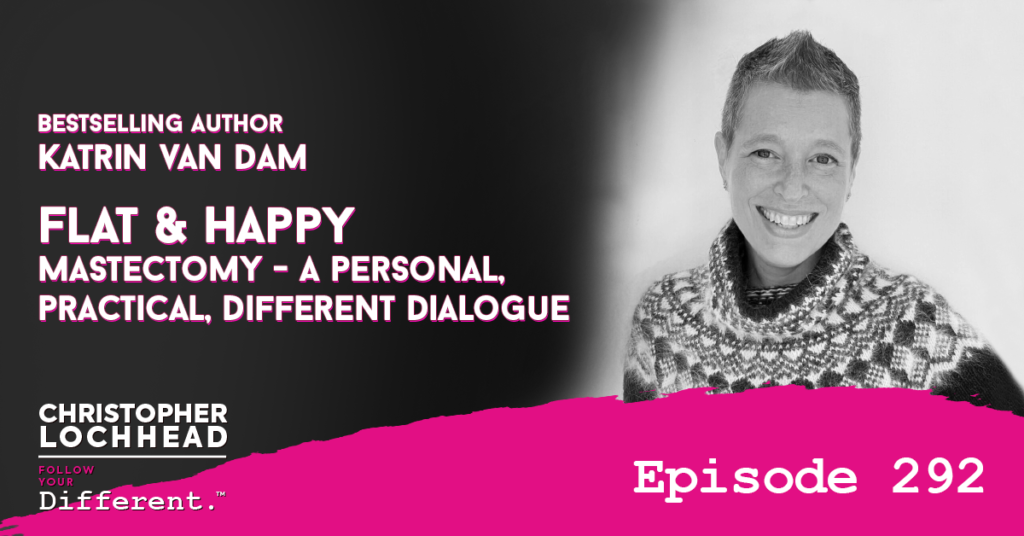
Podcast: Play in new window | Download (Duration: 1:20:06 — 55.0MB) | Embed
Subscribe: Apple Podcasts | Spotify | Pandora | RSS | More
On today’s episode of Christopher Lochhead: Follow Your Different, what you’re about to hear is a story of challenge, loss, courage, and triumph. We’re also releasing it now in part because October is Breast Cancer Awareness Month. So join us as we have a meaningful dialogue with our guest, Katrin Van Dam.
Katrin Van Dam is a successful executive in the media business, and she’s focused on content for kids and families. About three years ago, doctors told her that she had to have both breasts removed because of cancer. What she did next will surprise and will likely inspire you because she chose a different path.
By the end of this dialogue, I think you’ll gain some legendary insights into a problem that almost all of us will be touched by.
Katrin van Dam on Breast Cancer
The dialogue starts of with Christopher sharing that as people stay longer in this world, they experience a lot of expected and unexpected things. One of the unexpected things would be cancer and other serious ailments.
Katrin van Dam replies that it is not as unexpected as we all thought. Given that one in eight women get diagnosed with breast cancer. So rather than unexpected, it’s something to be aware of and get checked for every once in a while, after a certain age.
When Katrin was diagnosed with breast cancer, she found that both her breast had an invasive type of cancer. So rather than going for radiation, she opted to nip the problem in the bud and went with mastectomy.
Being Presented with Options
The part that Katrin found perplexing afterwards was when she found out that there was an option to not have breast reconstruction after undergoing mastectomy. Most would’ve probably taken reconstruction as part of the process, rather than an option.
But Katrin also clarifies that she’s not advocating that everyone not to have reconstruction, but consider if it is really something they want.
“I want to be clear about this. It’s a tremendous boon to somebody who wants to have breast mount reconstruction. For many, many women, that is a great way to be able to sort of move on from what’s happened to them and to reconnect with their bodies. And I don’t begrudge anyone that, but knowing that it was not for me.” – Katrin van Dam
She also points out that Breast Mound Reconstruction is not a one-and-done thing. It is normal for those pursuing it to have multiple operations to have the desired outcome that they want, and as with any operation, each one of those presents risks.
This is why Katrin is pissed that women aren’t given all the options upfront, and some have gone through painful and risky operations for something that they may have not wanted in the first place.
Making an Informed Decision
Katrin brings up a conversation she had with her husband when she informed him that she wasn’t getting the reconstruction. It surprised her that he did not give his immediate support on the matter, which got Katrin thinking if she missed something.
In retrospect, Katrin realized that they were not operating on the same knowledge base. She who has had time to research on the complications and risks of reconstruction can confidently say that she doesn’t want one, as compared to her husband who has not delved into the matter as deep as she did.
Another thing was that they were working on different assumptions: him thinking that having no breast would be a constant reminder of the cancer, while Katrin not caring about it at all.
In the end, Katrin realized that she could’ve communicated better, not just on the final decision, but on her process on how she got to that decision.
To hear more from Katrin van Dam on how to be Flat and Happy, download and listen to this episode.
Bio
Katrin van Dam has worked in children’s media and licensing for nearly thirty years and is currently a creative executive at a major media company.
A few months after her debut Young Adult novel was published, she was diagnosed with breast cancer and underwent a double mastectomy.
After getting a taste of the societal pressure to have reconstruction, she felt compelled to provide a resource for women who are facing this difficult decision. FLAT AND HAPPY, her first work of nonfiction, came out of that commitment.
Katrin lives with her husband in New York City.
She is an avid theatergoer and enjoys hosting raucous dinner parties and traveling.
Katrin is also passionate about good food, storytelling, and saving our beautiful, besieged planet (not necessarily in that order). She is a graduate of Yale University.
Links
Connect with Katrin van Dam!
More information about Breast Cancer: www.cancer.org
We hope you enjoyed this episode of Follow Your Different™! Christopher loves hearing from his listeners. Feel free to email him, connect on Facebook, Twitter, Instagram and subscribe on iTunes!
291 David Sacks All In Podcast “Rain Man”/Top Tech VC on Armageddon, Ukraine/Russia, Biden, US Mid-terms, Free Speech & more
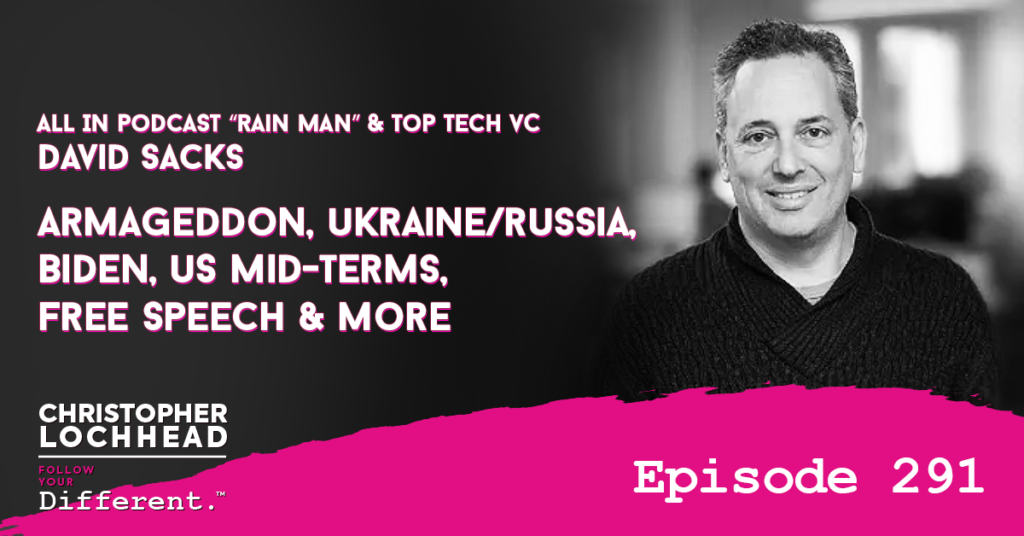
Podcast: Play in new window | Download (Duration: 1:31:18 — 62.7MB) | Embed
Subscribe: Apple Podcasts | Spotify | Pandora | RSS | More
US President Joe Biden recently warned about the possibility of Armageddon. He said “we have not faced the prospect of Armageddon since Kennedy and the Cuban Missile Crisis.” On this episode of Christopher Lochhead: Follow Your Different, we discuss the current situation in the US and around the world with All In Podcast Rain Man, David Sacks.
David Sacks is a legendary entrepreneur, category and company builder, and now venture capitalist. He’s the founder of a VC firm called Craft Ventures. He was the founding Chief Operating Officer of PayPal founder and CEO of Yammer, which sold to Microsoft for well over a billion dollars. He has been an early investor in companies like Facebook, Twitter, Uber, SpaceX, Airbnb, Slack, and more. And today, he’s also incredibly well known as one of the CO hosts of the All In podcast.
So listen in to keep up with current affairs, and you might learn a thing or two on how to prepare for the future.
David Sacks on Biden’s comment about Armageddon
We begin on the recent comments that Biden made about Armageddon. When asked why he thinks Biden’s thoughts went that way, David’s reply was:
“My reaction to this was the man who can’t see two steps ahead, suddenly realizes where his policy is leading. We’re the ones who have refused to engage in any sort of diplomacy or any sort of negotiated settlement. Our strategy is not to provide them with an off ramp.” – David Sacks
But David also thinks that Biden acknowledging this is a step in the right direction.
“That being said, I still thought it was incredibly useful for Biden to say what he said, because the first step of getting out of a problem is acknowledging that you’re in one.” – David Sacks
David Sacks on Tactical Nukes & Risking Nuclear War
There has also been talks of using tactical nukes to quickly resolve the situation. David does not agree with this, saying that using nukes at this point just opens up the risk of a nuclear war.
“If a tactical nuclear weapon gets used in Ukraine, then the whole world will be different. This thing could escalate very quickly into a larger scale nuclear war.
You had Petraeus on the Sunday shows last weekend saying that if Putin uses attack nukes, the US should respond by hitting every Russian military target in Ukraine? Well, again, think two steps ahead. How do you think the Russians would react to that, given that they clearly don’t have the military might to stand up to the US in terms of conventional arms?” – David Sacks
If countries start using nukes, then it signals that the former agreements against it can be violated with impunity. And that is a dangerous ground to tread.
Prediction or Deterrent
Returning to Biden’s statement about Armageddon, David suggests that, rather than being a prediction, this statement, along with Petreaus’, could be interpreted as a warning or deterrent against Russia going nuclear.
The problem is that the reasons why the Russians might escalate to the use of nuclear weapons is because they’re losing the war by conventional means. Add to the fact that Putin doesn’t have an off ramp that lets him keep his reign. Because if he loses this war, or doesn’t gain anything significant from it, it is very likely that he will be forced out of office by the public.
Putin is pretty much acting like a cornered beast at this point. The scary part is that you don’t know what that cornered beast might do as a last-ditch effort to escape.
To hear more from David Sacks and the current situation of the world, download and listen to this episode.
Bio
David Sacks is co-founder and general partner at Craft. He has been a successful founder and investor for over two decades, building and investing in some of the most iconic companies in tech. He has invested in over 20 unicorns, including Affirm, AirBnB, Bird, ClickUp, Eventbrite, Facebook, Houzz, Lyft, OpenDoor, Palantir, Postmates, Reddit, Slack, SpaceX, Twitter, Uber, and Wish.
David is also co-host of the popular “All-In Podcast” with Chamath Palihapitiya, David Friedberg, and Jason Calacanis.
David first got involved in the technology industry in 1999 when he joined early-stage startup Confinity, later renamed PayPal. Serving as the company’s first product leader and then as COO, David built and ran many of the company’s key teams, including product management and design, sales and marketing, business development, international, customer service, fraud operations, and HR. He pivoted the product from beaming money on Palm Pilots to emailing money on the web, and introduced the business model. When the company IPO’d on the Nasdaq in 2002, David was 29 — the median age of the “PayPal Mafia” executives listed on the S-1. PayPal was later acquired by eBay and eventually spun back out into a publicly traded company (under ticker symbol PYPL).
In 2008, David founded enterprise collaboration company Yammer, which was one of the first SaaS startups to apply consumer growth tactics to enterprise software. Yammer’s viral approach made it one of the fastest-growing SaaS startups in history, exceeding eight million enterprise users in just four years. As Founder/CEO of Yammer, David grew the company to roughly $60 million in sales and 500 employees. In July 2012, Microsoft acquired Yammer for $1.2 billion. It remains one of the fastest unicorn exits in SaaS.
Since Yammer, David has continued to be involved in the SaaS world, with an emphasis on “Bottom Up SaaS,” the strategy he pioneered at Yammer by combining product-led growth with B2B sales. Bottom-up SaaS companies combine the growth potential of B2C with the enterprise budgets of B2B, leading to explosive outcomes when ARR goes viral.
David is well known in Silicon Valley for his product acumen. AngelList’s Naval Ravikant has called David “the world’s best product strategist.” David likes to begin pitch meetings by seeing a product demo.
Links
Connect with David Sacks
Website | Bottom Up | All In Podcast | Twitter | LinkedIn
We hope you enjoyed this episode of Follow Your Different™! Christopher loves hearing from his listeners. Feel free to email him, connect on Facebook, Twitter, Instagram and subscribe on iTunes!
290 The End of Bias with Bestselling Author Jessica Nordell
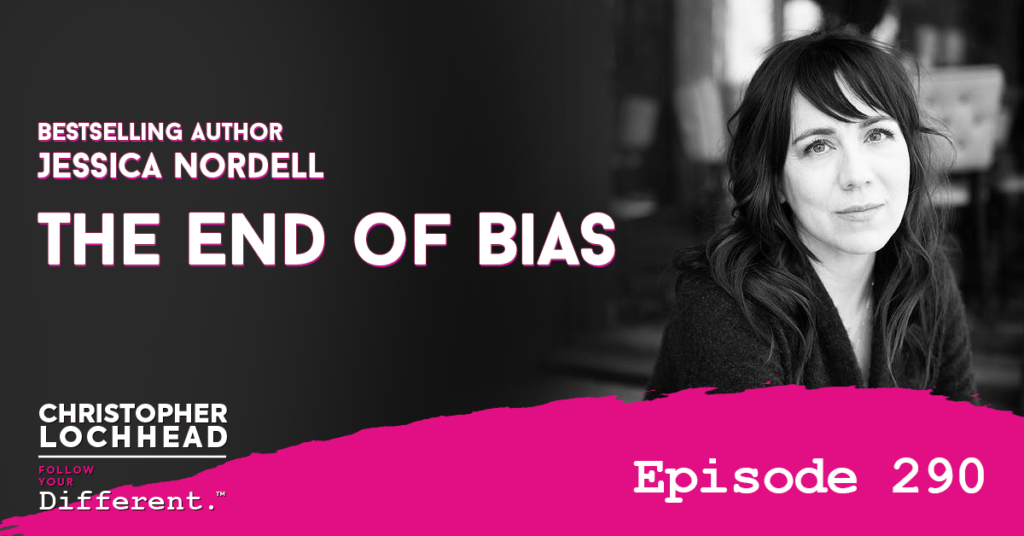
Podcast: Play in new window | Download (Duration: 1:29:10 — 61.2MB) | Embed
Subscribe: Apple Podcasts | Spotify | Pandora | RSS | More
Most people want to be welcoming of others and believe in equality for all human beings. But we’re all a little biased. On this episode of Christopher Lochhead: Follow Your Different, we go deep on the topic of bias with our guest, Jessica Nordell.
Jessica Nordell is a bestselling author who has written a book called The End of Bias. Jessica’s book has won a boatload of awards, including being named a Best Book of the Year by the World Economic Forum.
What you’re about to experience is a real different dialogue about what it really takes to end bias.
Jessica Nordell on Bias and Racism
The conversation starts off on the topic of Bias, and how it relates to racism.
Christopher asks if racism and bias served a purpose for humanity or not, to which Jessica replies:
“Racism certainly emerged because it had a very specific social, political and economic purpose, which was to enable the existence of chattel slavery. In order to justify and sort of perpetuate the existence of that inhumane practice, what we would look at now as a criminal, criminally inhumane enterprise, Racism had to exist as a as a way to justify it. Because if a group of people are seen as lower on a social hierarchy, then it’s much easier to justify that kind of inhumane behavior.” – Jessica Nordell
Jessica Nordell on the Origin of Racism
Following up on the topic, Jessica was asked if these ideas of being superior over a certain race or gender started existing after a certain period, or did humanity have these notions from the start.
Jessica explains that this particular question was one of the things she really dug into in her research for her book, The End of Bias.
One of the things she found was that in ancient Egyptian civilization, there was no notion of skin color prejudice. There were even evidence of non-ethic people rising on the Egyptian political administration, which suggests a high intermingling of people in the region.
This suggests that contemporary racism was invented at a certain point in time for a specific purpose.
Jessica Nordell on Male-Female Bias
When asked if it was the same for Male & Female biases, Jessica shares that Patriarchy predates the written word, which means the position of men above women is a really old school of thought.
But there have been civilizations and ethnicities that flip that over its head. For example, in ancient Mesopotamia women are associated with divinity. There was a sense of women being associated with authority and leadership, which has eroded over time.
So it’s hard to find the origin of Patriarchy, because by the time we have writing, it was already there, and men were doing the writing.
To hear more from Jessica Nordell and what it takes to actually end bias, download and listen to this episode.
Bio
Jessica Nordell is an award-winning author, science writer, and speaker known for blending rigorous science with compassionate humanity.
Her first book, The End of Bias: A Beginning, shortlisted for the 2022 Columbia Journalism/Lukas Prize for Excellence in Nonfiction, the 2022 NYPL Bernstein Book Award for Excellence in Journalism, and the 2021 Royal Society Science Book Prize, is the culmination of fifteen years of reporting and writing on the subject of bias and discrimination and how to solve it, for publications including the New York Times, the Atlantic, and the New Republic.
The End of Bias was named a Best Book of the Year by the World Economic Forum, Greater Good, AARP, and Inc and is currently being used by organizations from newsrooms and startups to universities, healthcare organizations, and faith communities to solve some of their biggest cultural challenges.
Deeply engaged with connecting across differences to expand and heal the human experience, Nordell’s own early-career experience with workplace bias inspired her passion for tackling discrimination and for seeing others in their full complexity and humanity.
With degrees in physics from Harvard and poetry from the University of Wisconsin, Nordell undertakes pioneering collaborations across disciplines; her work with computer scientists to simulate the real-world impact of workplace bias became a 2021 viral NYT story. Nordell is the recipient of a Gracie Award from American Women in Radio and Television, was named a Best New Poet by Tracy K. Smith, and was a 2022 featured speaker at SXSW. She is a direct descendent of the last woman to be tried for witchcraft in the state of Massachusetts, and is an amateur rock drummer.
Links
Connect with Jessica Nordell!
Read her book: The End of Bias
We hope you enjoyed this episode of Follow Your Different™! Christopher loves hearing from his listeners. Feel free to email him, connect on Facebook, Twitter, Instagram and subscribe on iTunes!
289 The Secret Life of Secrets with Columbia Professor & Bestselling Author Michael Slepian
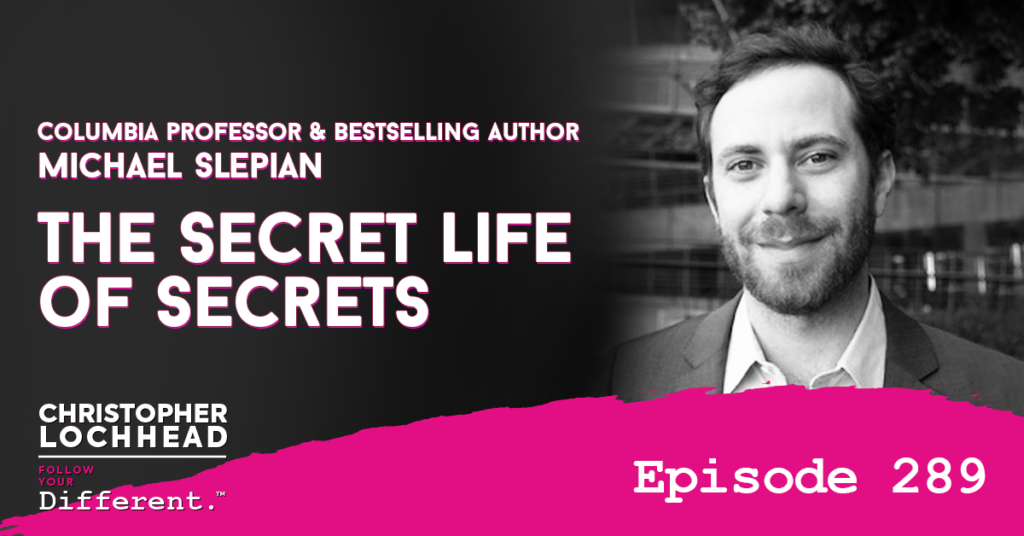
Podcast: Play in new window | Download (Duration: 57:44 — 39.6MB) | Embed
Subscribe: Apple Podcasts | Spotify | Pandora | RSS | More
On this episode of Christopher Lochhead: Follow Your Different, we talk about something that every single one of us has, very few of us think or talk about, and it’s something that can have a profound impact on our lives. So let’s talk about Secrets with our guest, Michael Slepian.
Michael Slepian is an Associate Professor of Leadership and Ethics at the legendary Columbia University. He’s also a recipient of the Rising Star Award from the Association of psychological science. Michael is considered by many to be the leading expert on the Psychology of Secrets.
He’s got a brand-new best seller out called The Secret Life of Secrets, which we will get into this episode and much more.
Michael Slepian on Secrets
The conversation starts out on secrets, and how we all keep them. As to why we have secrets, Michael was asked if there were pros and cons in keeping secrets from people.
“So the pros, you are protecting something, you might be protecting your reputation. And in your own mind, you might be protecting someone’s feelings, you might be protecting a relationship with someone. Whatever you think is the outcome of people learning about this thing, you’re preventing that.” – Michael Slepian
But to keep a secret means you are essentially cutting yourself off from other people, so they couldn’t share your burdens or provide emotional support if that is part of what you are keeping your secret from.
“You’re blocking yourself from the availability of getting help from others. You can’t get their emotional support; you can’t get their guidance and advice.” – Michael Slepian
Why We Keep Secrets
One reason that we keep secrets is that we often feel ashamed of those secret. In response, we bury it deep and isolate it from the public, so no one will know.
But this process of isolation also keeps it from receiving any validation if the secret is something to be actually ashamed of, or something that one only thought would be unacceptable.
“We’ll feel isolated with those secrets, we’ll feel inauthentic for keeping them and uncertain that we’re doing the right thing. But all these negative feelings are tempered easily when we start talking to people and getting the help that we need.” – Michael Slepian
Having Secrets is Natural
Michael further explains that having secrets is normal, and that people tend to keep the same secrets. On his research that shows 38 common categories of secrets, an average person has 13 secrets that fall on that list, and 97% of people would have more than one secret that is in that list.
“We all keep the same kinds of secrets. As isolating as a secret can feel, we all have similar ones. And so we’re not alone in the secrets we have.” – Michael Slepian
To hear more from Michael Slepian and the secret about Secrets, download and listen to this episode.
Bio
Michael Slepian is the Sanford C. Bernstein & Co. Associate Professor of Leadership and Ethics at Columbia University.
A recipient of the Rising Star Award from the Association for Psychological Science, he is the leading expert on the psychology of secrets. Slepian has authored more than fifty articles on secrecy, truth, and deception.
His research has been covered by The New York Times, The Atlantic, The New Yorker, The Economist, The Wall Street Journal, the BBC, NPR, and more.
Links
Connect with Michael Slepian!
Website | Twitter | LinkedIn | Columbia bio
Check out his new book: The Secret Life of Secrets
We hope you enjoyed this episode of Follow Your Different™! Christopher loves hearing from his listeners. Feel free to email him, connect on Facebook, Twitter, Instagram and subscribe on iTunes!
288 Leadership Lessons From Taco Bell, KFC &Pizza Hut, David Novak, Founder/former CEO Yum! Brands & Author of Take Charge of You
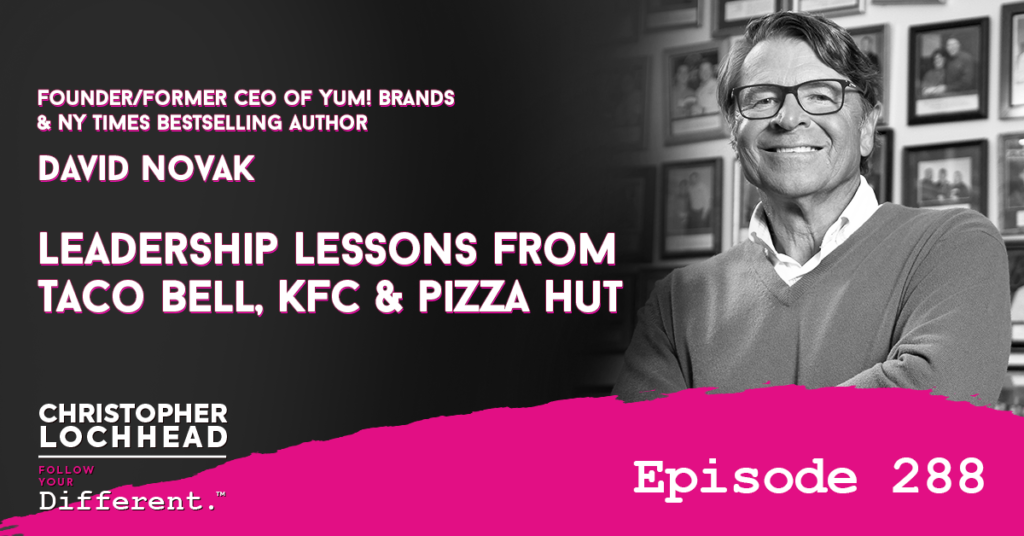
Podcast: Play in new window | Download (Duration: 1:12:08 — 49.5MB) | Embed
Subscribe: Apple Podcasts | Spotify | Pandora | RSS | More
It is said that the people who have the most legendary careers are what you might think of as other-directed. The key to a successful life is to remove your joy blockers, and the goal of a career should be to, as Warren Buffett says, dance your way to work. We talk about all these and more on Christopher Lochhead: Follow Your Different with our guest David Novak.
David Novak is the co-founder and was the CEO for 17 years of the legendary Yum! brands. Yum! is the world’s largest restaurant company, which owns Kentucky Fried Chicken, Taco Bell, and many others. David also has an amazing podcast called How Leaders Lead, and a new book called Take Charge of You: how self-coaching can transform your life and your career.
Learn how be a legendary leader, executive, and entrepreneur from the best by listening in to this episode.
David Novak on Looking Back on his Career
The conversation begins with David’s new book, and how it is a window to his career and life, and the interesting events and tidbits that go along with it.
“I was the first kid in my family to get a college education, got a degree in journalism, didn’t get an MBA, ended up becoming a CEO, and have the time of my life building a fantastic company. Now I’m in my next phase of my life where I’m fortunate enough to be able to spend time on the things that truly give me joy.” – David Novak
Nowadays, David focuses on Leadership Development, and shares his thoughts and insights in his podcast, How Leaders Lead by David Novak. He also has time to write books, which has been a big passion of his.
David Novak on Reaching One’s Goals and What Comes After
The topic shifts on how most of the books and guides in entrepreneurship that is published are focused on personal growth and development, but there are only a few on what happens when you achieve those goals. Because life doesn’t stop when you reach those goals – there has to be something else to direct your passion into.
David agrees and adds to it that after proving yourself and learning to manage and eventually lead people, the goal post shifts ever so slightly, and you find other ways to draw success.
“Well, I have to tell you, that a lot of the research out there says that, you know, the people that are the happiest are other directed. What I’ve found is that the more other directed I got, the more I focused on other people’s success more than my own, the more success I ultimately got. And, you know, it’s kind of an amazing thing.” – David Novak
On the Current State and Rising Up Again
The conversation then goes to the current state of things, where inflation and the looming threat of recession is on the rise. David comments that there is current a huge divide, particularly in the haves and have nots, especially in the environment that they are in.
That is not to say that there aren’t any people who thrive in harsher environments, but David wishes that people would at least have the chance to nurture themselves and grow.
“I hope one day, my goal is somehow from all the leadership development I do that there’ll be one person that will rise up in this country and inspire people again.” – David Novak
To hear more from David Novak and how you can take charge of you, download and listen to this episode.
Bio
David Novak, Founder/former CEO Yum! Brands & NY Times Bestselling Author
Starting with an undergrad degree in Journalism from the University of Missouri, David grew from his first job as a copywriter at a small ad agency to become a New York Times best-selling author, co-founder and former CEO and Chairman of Yum! Brands, the world’s largest restaurant company (KFC, Taco Bell, Pizza Hut), and now, founder of the non-profit organization, David Novak Leadership, Inc. and host of top-rated leadership podcast, How Leaders Lead with David Novak.
David was named “CEO of the Year” by Chief Executive magazine, one of the world’s “30 Best CEOs” by Barron’s, one of the “Top People in Business” by FORTUNE and one of the “100 Best-Performing CEOs in the World” by Harvard Business Review. And he’s passed it on. Today, there are over 26 CEOs of major American corporations that David has coached or led earlier in their careers.
Links
Connect with David Novak!
How Leaders Lead | How Leaders Lead – Twitter
Read the book: Take Charge of You
We hope you enjoyed this episode of Follow Your Different™! Christopher loves hearing from his listeners. Feel free to email him, connect on Facebook, Twitter, Instagram and subscribe on iTunes!

